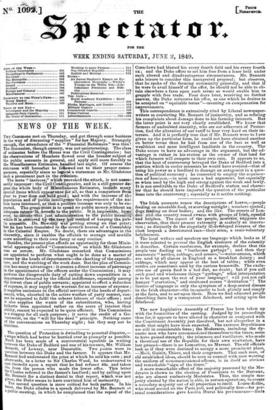NEWS OF THE WEEK.
THE Commons met on Thursday, and got through some business in the way of discussing "supplies" for her Majesty. Strangely enough, the attendance of the " Financial Reformers" was thin! The discussion, though cursory, was not uninteresting. The class of estimates before the House was the Civil Contingencies ; but the observations of Members flowed over the broader subject of the public accounts in general, and apply still more forcibly to the Miscellaneous Estimates, handled last night. Of course the strictures will hereafter be followed out to their proper conse- quences, especially since so logical a statesman as Mr. Gladstone took a prominent part in the criticism. The mere " increase," which provoked the attack, is not neses., sarily improper : the Civil Contingencies, and in a still greater de- grea.the whole body of Miscellaneous Estimates, inahide many special items which appear once for all, so that a comparison from year to year does not hold good ; and with the increase of th> population and of public intelligence the requirements of the na- tion have increased, so that a positive increase was only to be ex- pected. The great point is to spend no public money,without an adequate return- rh benefit to the public. It is imposAble, how ever, to iusue'e that just administration to the public fuss while it is obscured by the,very_l t nvelhod of keeping timpub-- !ic accounts. Dr. Bowrigg was getting strong on that point; but he has been translated to the seventh heaven of a Consulship in the Celestial Empire. No doubt, there are advantages in the obscurity, since-it enables the officials to manage and muddle more according to their own fancy or easy routine.
Besides, the present plan affords an opportunity for those Minis- terial appanages called "Commissions," on which Mr. Gladstone was so severe. Mr. Gladstone remarked that Commissions are appointed to perform what ought to be done as a matter of course by the heads of departments—the checking of the expendi- ture, and the watching of the work done. But the plan of Commis- sion has many advantages : it creates a direct increase of patronage in the appointment of the officers under the Commission ; it may perform the disagreeable duty of cutting down expenditure in a department favoured by the official indifference, especially among the lowest class of public servants; appointed to effect a reduction of expense, it may supply the warrant for an increase of expense ; it supplies omissions in the official services of the heads of depart- ments, who, absorbed in the active warfare of party contest, can- not be expected to fulfil the soberer labours of their offices ; and it also supplies the wants of the subordinates, who, having hitherto been appointed rather on the score of interest than ability, cannot be expected to be quite efficient. The Commission is a stopgap for all such purposes ; it saves the credit of a Go- vernment, on the "will for the deed" principle. Nothing came of the conversations on Thursday night ; but they may not be fruitless.


























